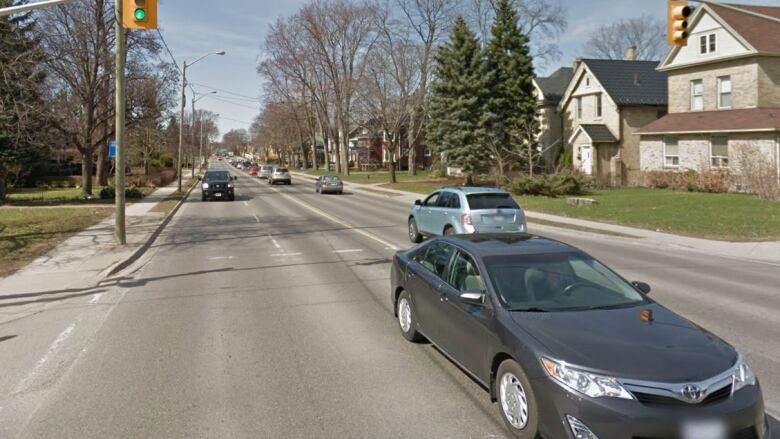BRT lane recommendations: Richmond stays at 4 lanes, Wellington Road goes to 6
City says holding Richmond to 4 lanes will only increase commute by 2 minutes for drivers

Engineers for London's Bus Rapid Transit system (BRT) are recommending against adding two general traffic lanes on Richmond Street north of Oxford.
Instead, they're calling for Richmond to remain four lanes in total, with the centre two lanes devoted to BRT buses.
The recommendations for Richmond were included in a package of preferred lane configurations for the $560-million transit system that will add high-frequency bus routes linking the downtown core with outside neighbourhoods.
For Richmond, it means engineers are opting against widening Richmond from four lanes to six. But by devoting two of Richmond's four lanes to buses, traffic will slow along a corridor that already becomes congested during rush hour.
Material presented to reporters in a briefing Monday said losing the two general traffic lanes will increase travel time by less than two minutes between Oxford and Western University for commuters driving their own private vehicles.
BRT's Jennie Ramsay said this is because BRT will allow traffic to flow more efficiently along Richmond.
For example, BRT will eliminate left turns along Richmond. Instead, traffic will U-turn at the major intersections. Also, she said traffic will move quicker because buses won't be blocking travel lanes.
Also, she said planned improvements to adjacent north-south corridors Western Road and Adelaide Street will take some of the pressure of Richmond.
"While they're may be two physical lanes there [on Richmond], they're not operating like two physical lanes. We'll be providing one lane that is unencumbered and allows traffic to move well."
Documents presented at Monday's briefing said adding lanes to Richmond will be cheaper and better for property owners, who won't lose yard space to new lanes.
Ward 6 Coun. Phil Squire said he questions the traffic projections put forward by BRT engineers, but says sticking to four lanes total is a better option than widening Richmond.
Oxford west to get new lanes
Here BRT officials are recommending two new general traffic lanes for a total of six. Again, the two centre lanes will be dedicated to BRT buses.
Wellington Road to add lanes
One road engineers are calling to be widened for BRT is Wellington Road between Base Line road and Bradley Avenue.
Two general traffic lanes will be added, bringing the total number of lanes to six (including the two BRT-dedicated centre lanes).
On Wellington Curve (Wellington Road south of the Thames River to Base Line Road) the curve will be lengthened by "strategically widening to balance impacts on both sides."
The plan calls for minimizing impacts to St. Andrew Memorial Church. BRT officials say there will be "significant impacts" for property owners in this area.
"The city will continue to work with property owners throughout the process," according to BRT documents.
Other areas
- Dundas Street: Again, BRT buses will run in centre lanes.
- East Turnaround: BRT buses will reach their eastern terminus after an expansion to the existing terminal at Fanshawe College on Oxford Street.
- West Turnaround: Engineers are opting for a combined rapid and regular transit stop on Capulet Lane.
- North Turnaround: The existing transit loop at Masonville Mall will be expanded.
Next stop: More consultation, then council on April 9
BRT staff will present these preferred options at the following five open houses:
- Wednesday Feb. 28: Central Public Library; 11 am. to 2 p.m.
- Wednesday Feb. 28: 5:30 p.m. to 8:30 p.m.; Oakridge Secondary School.
- March 1: 5 p.m. to 8 p.m.; Western University, London Hall.
- March 3: 9 a.m. to 12 p.m.; Redeemer Evangelical Lutheran Church.
- March 4: 3 p.m. to 6 p.m.; Fanshawe College, H1013 Cafeteria.
Council is scheduled to vote on the recommendations at its April 9 meeting.
Construction is tentatively slated to start 2019/2020 with the full 24-kilometre network expected to take eight years to build.